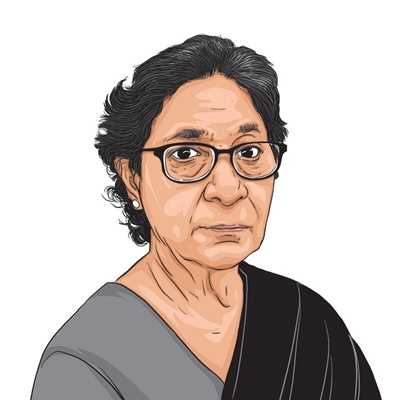Opinion Imminent disintegration of INDIA coalition is a squandered opportunity
Opposition alliance could have pooled its strengths, compensated for its weaknesses and presented itself as a viable challenger to the BJP
 The future of the INDIA alliance hangs in the balance as Bihar CM and JD(U) chief Nitish Kumar looks to return to the NDA fold. (File Photo/PTI)
The future of the INDIA alliance hangs in the balance as Bihar CM and JD(U) chief Nitish Kumar looks to return to the NDA fold. (File Photo/PTI) The consecration of the Ram temple on January 22 by Prime Minister Narendra Modi is exactly the sort of big, splashy event that the Opposition needs as the fissures within threaten to break up the collective. The parties of the INDIA alliance can cover up their failure by blaming majoritarian nationalism, wily politics and misguided voters.
As speculation spirals about what Janata Dal (United) leader Nitish Kumar may do, other powerful regional parties like the Trinamool Congress in West Bengal and the Aam Aadmi Party in Punjab have declared that they will not enter into any seat-sharing deals with the Congress. It is increasingly obvious that coordination between long-time rivals, principally the Congress, is turning out to be an avoidable nuisance.
Even before the INDIA bloc had been dreamed of, Mamata Banerjee had laid out a blueprint of how the anti-BJP Opposition would fight together in the 2024 elections. Seat sharing was not part of her design, especially not with the Congress and certainly never with the CPIM — one a bitter rival and the other her archenemy. This is what made her firm friends with Arvind Kejriwal and partners in engaging in a dialogue with other regional parties, including the Samajwadi Party in Uttar Pradesh, the Rashtriya Janata Dal in Bihar, the DMK in Tamil Nadu, and the Jharkhand Mukti Morcha in Jharkhand to establish a platform that would offer itself as an alternative to the Congress on the one hand and the BJP on the other. Telengana’s K Chandrashekhar Rao led his own initiative to build an alternative coalition.
There is careful calculation underpinning the decision by Trinamool Congress to contest all 42 seats in West Bengal, by AAP to contest all 13 seats in Punjab and Akhilesh Yadav’s declaration that Samajwadi Party would not negotiate with Congress on seat sharing. Concessions to the Congress in terms of seats would not benefit the dominant regional party. On the contrary, seat adjustment would probably reduce the number of wins that each of these parties can realistically expect against an aggressive and formidably well-provisioned BJP.
As parties that came together to form the INDIA bloc with the Congress last year, there was an expectation that the alliance could pool its strengths, compensate for its weaknesses and present itself as a viable challenger to the BJP. From the slow pace of parleys on seat sharing and the conspicuous absence of coordination with partners of the INDIA bloc, as the Bharat Jodo Nyay Yatra wends its way across India from the Northeast to the west, it is likely that the dominant and ruling regional parties of the bloc realised that Congress was not ready to play second fiddle by acknowledging its subordinate status.
The facts are revealing. Of the 355 Lok Sabha constituencies that the Bharat Jodo Nyay Yatra will cross on its 6,200 km journey, the Congress won a mere 14 seats in 2019. The regional and smaller parties won in 119 seats and the BJP won in 236 seats. Defending these seats in many places against the Congress is as critical for the regional and smaller parties as it is to defeat the BJP. It is imperative for the survival and future of the regional and smaller parties to try and save the seats they won in 2019 because they know the BJP will use its formidable and limitless resources to defeat them in the next round of state assembly elections after 2024. The vote share of the India bloc is around 38 per cent, while the BJP’s vote share is 37 per cent, minus its allies. A collective push by the partners of the INDIA bloc would have been harder for the BJP and its allies to resist than a divided opposition.
A strategy for the consolidation of votes of a coordinated Opposition that could have been negotiated had the allies of the INDIA bloc worked on it may have been a tough challenge for the BJP. The crumbling coordination of the parties within the INDIA bloc is an unequivocal message to voters that the idea of a collective enterprise is a non-starter.
The imminent disintegration of the INDIA bloc of anti-BJP parties is a squandered opportunity. The collection of leaders have failed to find ways to make adjustments and accommodations that are integral to coalition building. Prevailing punditry opines that fragmentation of votes of a divided Opposition is a gift that the BJP will use to improve its seat tally from the 303 seats it won in 2019. In support of this argument are the results of the recently concluded Rajasthan, Madhya Pradesh and Chhattisgarh assembly elections. The Congress vote share remained almost unchanged from 2018 when it became the ruling party in these three states. In other words, voter preferences did not change for the Congress. Voters from parties that wanted a seat-sharing arrangement with the Congress switched to the BJP which wooed them in different ways, giving it the edge it needed to win.
As each of the parties of the INDIA bloc fight to defend their territories against a BJP surge riding on the Hindutva high of the temple consecration, if voters switch loyalty from a regional or smaller party to the BJP, the careful calculation that went into the making of possible alliances will have been an exercise in futility.
The writer is a senior journalist based in Kolkata





